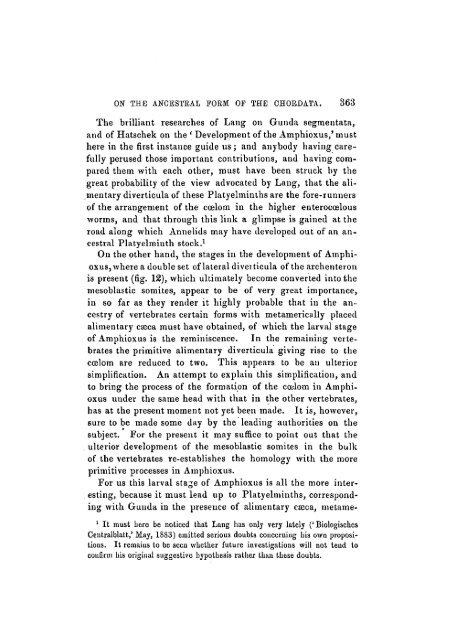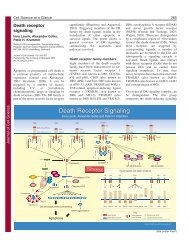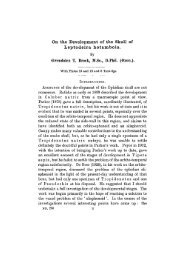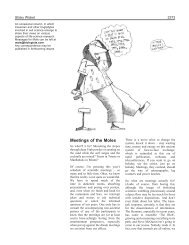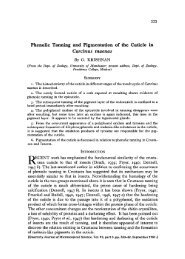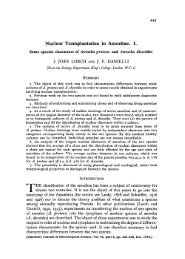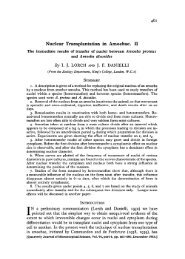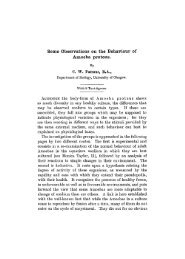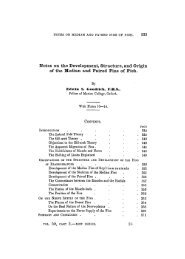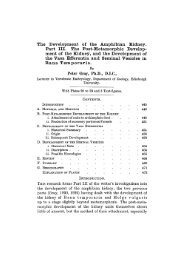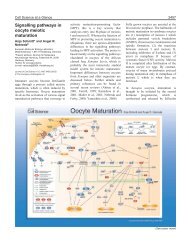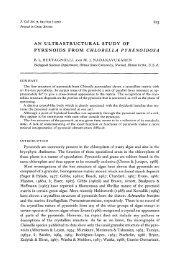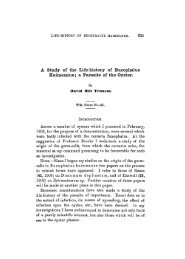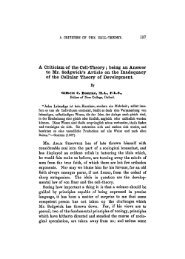On the Ancestral Form of the Chordata.
On the Ancestral Form of the Chordata.
On the Ancestral Form of the Chordata.
Create successful ePaper yourself
Turn your PDF publications into a flip-book with our unique Google optimized e-Paper software.
ON THE ANCESTRAL 1'OJBM OF THE OHORDATA. 363<br />
The brilliant researches <strong>of</strong> Lang on Gunda segmentata,<br />
and <strong>of</strong> Hatschek on <strong>the</strong> ' Development <strong>of</strong> <strong>the</strong> Amphioxus,' must<br />
here in <strong>the</strong> first instance guide us; and anybody having carefully<br />
perused those important contributions, and having compared<br />
<strong>the</strong>m with each o<strong>the</strong>r, must have been struck by <strong>the</strong><br />
great probability <strong>of</strong> <strong>the</strong> view advocated by Lang, that <strong>the</strong> alimentary<br />
diverticula <strong>of</strong> <strong>the</strong>se Platyelminths are <strong>the</strong> fore-runners<br />
<strong>of</strong> <strong>the</strong> arrangement <strong>of</strong> <strong>the</strong> ccelom in <strong>the</strong> higher enteroccelous<br />
worms, and that through this link a glimpse is gained at <strong>the</strong><br />
road along which Annelids may have developed out <strong>of</strong> an ancestral<br />
Platyelminth stock. 1<br />
<strong>On</strong> <strong>the</strong> o<strong>the</strong>r hand, <strong>the</strong> stages in <strong>the</strong> development <strong>of</strong> Amphioxus,<br />
where a double set <strong>of</strong> lateral divevticula <strong>of</strong> <strong>the</strong> archenteron<br />
is present (fig. 12), which ultimately become converted into <strong>the</strong><br />
mesoblastic somites, appear to be <strong>of</strong> very great importance,<br />
in so far as <strong>the</strong>y render it highly probable that in <strong>the</strong> ancestry<br />
<strong>of</strong> vertebrates certain forms with metamerically placed<br />
alimentary caeca must have obtained, <strong>of</strong> which <strong>the</strong> larval stage<br />
<strong>of</strong> Amphioxus is <strong>the</strong> reminiscence. In <strong>the</strong> remaining vertebrates<br />
<strong>the</strong> primitive alimentary diverticula giving rise to <strong>the</strong><br />
ccelom are reduced to two. This appears to be an ulterior<br />
simplification. An attempt to explain this simplification, and<br />
to bring <strong>the</strong> process <strong>of</strong> <strong>the</strong> formation <strong>of</strong> <strong>the</strong> ccslom in Amphioxus<br />
under <strong>the</strong> same head with that in <strong>the</strong> o<strong>the</strong>r vertebrates,<br />
has at <strong>the</strong> present moment not yet been made. It is, however,<br />
sure to be made some day by <strong>the</strong> leading authorities on <strong>the</strong><br />
subject. For <strong>the</strong> present it may suffice to point out that <strong>the</strong><br />
ulterior development <strong>of</strong> <strong>the</strong> mesoblastic somites in <strong>the</strong> bulk<br />
<strong>of</strong> <strong>the</strong> vertebrates re-establishes <strong>the</strong> homology with <strong>the</strong> more<br />
primitive processes in Amphioxus.<br />
For us this larval stage <strong>of</strong> Amphioxus is all <strong>the</strong> more interesting,<br />
because it must lead up to Platyelminths, corresponding<br />
with Gunda in <strong>the</strong> presence <strong>of</strong> alimentary caeca, nietame-<br />
1<br />
It must Lere be noticed that Lang has only very lately ('Biologisches<br />
Centralblatt,' May, 1883) emitted serious doubts concerning bis own propositions.<br />
It remains to be seen whe<strong>the</strong>r future investigations will not tend to<br />
confirm bis original suggestive hypo<strong>the</strong>sis ra<strong>the</strong>r than <strong>the</strong>se doubts.


